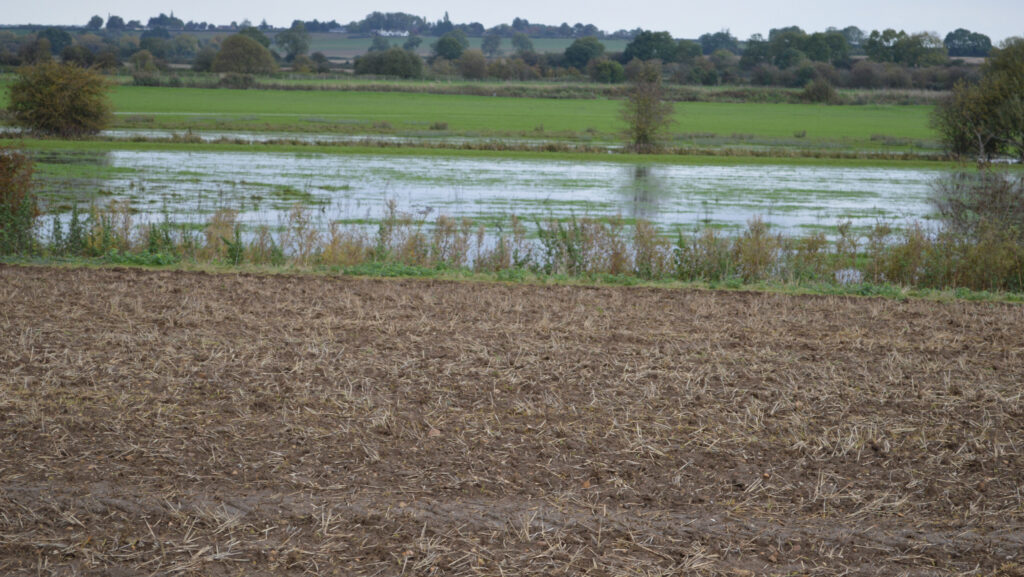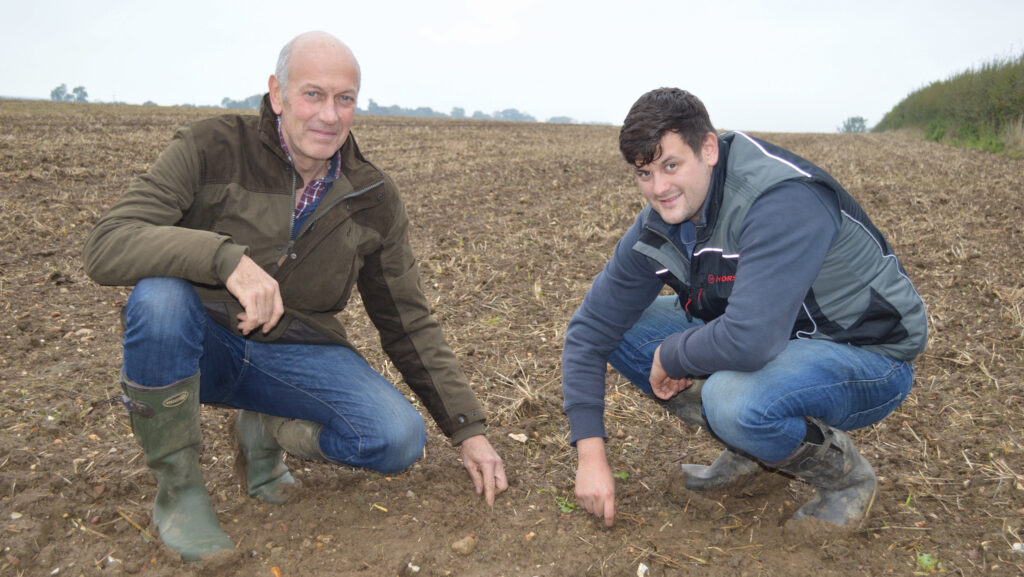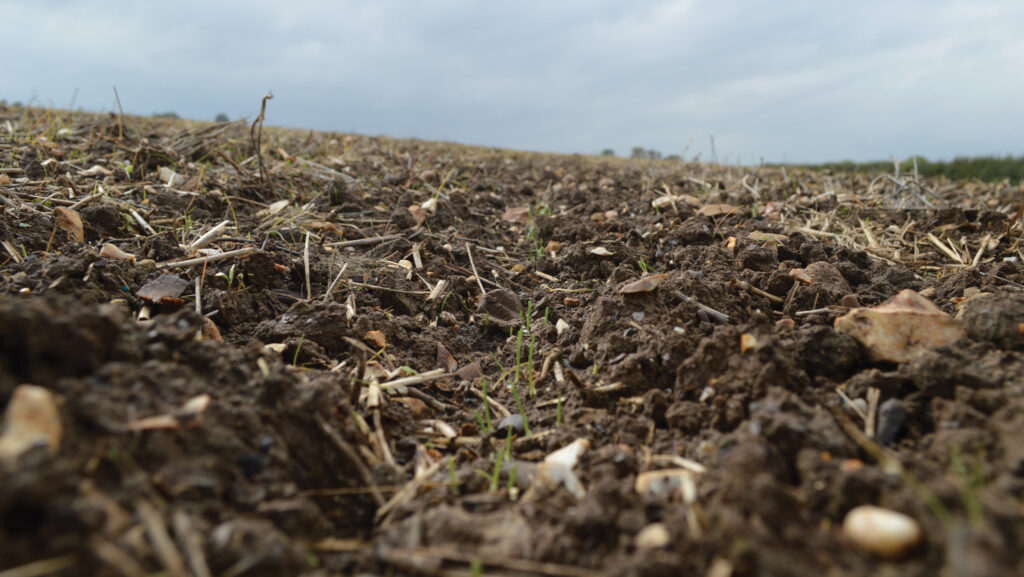Soils improve for Northants grower after a switch to regen
 © David Jones
© David Jones Peter Mee has cut his growing costs while holding his arable yields steady after four years of regenerative farming having improved the structure of his soils close to the flood-prone River Nene.
Winter wheat yields are close to 9t/ha, while nitrogen fertiliser has been trimmed back and diesel costs slashed on his north Northamptonshire arable farm, and he has seen no flooded fields over the past very wet 12 months.
Most of his winter wheat was drilled by mid-October this season, a testimony to his better draining soils after one of the wettest autumns on record, and better soils are making planning for new environmental payments easier.
See also: Nuffield tour shows a way ahead for ‘bleak’ potato sector
“We have seen massive improvements over the last four years of regenerative farming, with soils easier to work, especially the heavy clays,” Peter tells Farmers Weekly.
His shift to regen farming is dovetailing into the Sustainable Farming Incentive (SFI), as with the resulting healthier crops he can claim for a no use of insecticide payment, and seed for his cover and catch crops is also covered by a SFI payment.

Peter Mee (left) and son Charlie © David Jones
He has claimed for a no-insecticide payment of £45/ha (CIPM4) for just over 70% of the farm, and a cover crop payment of £129/ha (CSAM2) and also for catch crops, while he is planning to claim for no-till, precision fertiliser and companion crops in the future.
Peter’s decision to turn to regen farming on his 300ha arable Lyveden Farm, trading as Mee Farmers, Nassington, just three miles west of Peterborough, four years ago was to improve the quality of his soil and leave the farm in a healthier state for his family.
He farms with his wife Zoe, son Charlie, daughter Emily and Charlie’s wife Charlotte.
Peter was keen to keep all the family involved in the farm and leave it in a good shape for future generations.
The farm grows winter wheat, winter beans and spring crops of barley and oats on land which ranges from heavy clays to light gravel, and on the lighter land he is growing blueberries for a range of supermarkets.
He also contract farms a further 340ha, and is hoping to introduce regen farming to that land, as with the resulting better soil quality on his own land he uses 20kg/ha less nitrogen fertiliser on his winter wheat, at 160kg/ha, as opposed to 180kg/ha on the contracted land.
In addition, he is using less diesel for his largely no-till and min-till establishment methods on the home farm compared with heavier cultivations on the contracted land.
Furthermore, he has moved to lower horsepower tractors as his soils have improved.

An emerging crop of Extase winter wheat © David Jones
Ahead of the establishment of his winter wheat crops, all straw from the preceding crop is baled as he says earthworm numbers are still too low at the moment to break down fully the straw.
Then, the ground is either direct drilled or minimum cultivated, usually with a Horsch Joker disc harrow and then drilled.
Drilling is conducted with either a 6m Horsch Avatar disc drill or a smaller 3m tine Simtech drill.
Winter wheat varieties this season are largely Dawsum and Extase, and yields have been steady at about 9t/ha over the transition to regen farming.
Organic matter is added every two years across the home farm at a relatively low application rate of 5t/ha.
This is a mix of horse and poultry manure with spent hops. The low application rate gives some nutrition for the crops, but is largely aimed at increasing the microbes in the soil.
As well as reducing nitrogen on the wheat, he is also looking to cut his use of chemicals as his soil fertility improves, and hopes to use less fungicide in the future but use more trace elements.
The greater use of SFI in the future on the farm will also complement an existing Mid-Tier Countryside Stewardship agreement..
“Regen farming, SFI and Mid-Tier are helping marginal land on the farm to pay its way,” he says.
Five steps towards SFI
Arable growers are being urged to look at a five-step approach towards gaining from SFI with any major expenditure, says Peter Brown of Catchment Sensitive Farming (CSF).
He advises farmers in the River Nene Valley catchment area running through Northampton, Peterborough, Wisbech and into The Wash.
The CSF is a government-funded agency set up to advise farmers on improving water and air quality and to reduce flooding.
“Make sure you are rewarded for the actions you are already doing on the farm,” says Peter.
His five-step approach to SFI for arable growers is:
- Look at management plans, such as a soil management plan which pays £6/ha and £97/agreement (CSAM1), and also an Integrated Management Plan at £1,129 (CIPM1)
- Establish a framework with hedgerows, such as managing hedgerows at £13/100m for one side of a hedge (CHRW2), and also payments for buffer strips (CAHL4) and grassy field corners (CAHL3)
- Support your soils, such as with winter cover crops at £129/ha (CSAM2) and no-till at £73/ha (SOH1)
- Look at rotational options such as legume fallow at £593/ha (CNUM3) and winter bird food at £853/ha (CAHL2)
- Optimise Integrated Pest Management and input levels, such as no use of insecticides at £45/ha (CIPM4), variable rate fertiliser at £27/ha (PRF1) and use of companion crops at £55/ha (CIPM3).
Peter points out that on a 174ha example farm in the Weald of Kent with 144ha of arable cropping and some grassland and woodland, and with no major changes to farm management, the SFI could raise £58,534 per year in revenue.
This is ahead of the old annual Basic Payment Scheme (BPS) set in 2020 at £233.30/ha before the payments began to decline.
But as BPS is largely profit, SFI is only revenue with a number of costs incurred such as cover crop seed, yield penalties from a low input cereal options and often extra fieldwork and management, before profit can be calculated.
Farm facts
Mee Farmers, Lyveden Farm, Nassington, Peterborough
- Farming 300ha at the home farm and 340ha of land contract farmed, consisting of heavy clay soils to light gravels.
- Growing winter wheat, winter beans, spring barley, spring oats and also blueberries.
Peter Mee and Peter Brown were speaking to Farmers Weekly at a “Know Your Soils” event on Peter Mee’s north Northamptonshire farm, organised by the AHDB in collaboration with Catchment Sensitive Farming, in late 2024.
